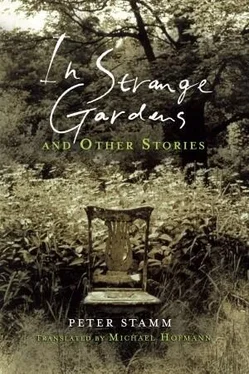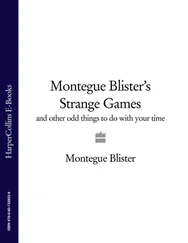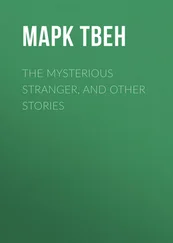“What does that have to do with it?” asked Marianne.
When the train moved off, the last of the sick people drew in their heads. The blinds came down.
“I’d like to know what time they’ll get there,” said Marianne. “How far do you think it is from here to Lourdes?”
“No idea,” I said. “I can’t imagine they’ll be there before tomorrow morning.”
“People are forever traveling,” said Daniel, “even sick people. Even dead people. I’m sure they’ll take him back to wherever he started out from. As if that made a difference.”
I thought about the train rolling on through the night, going through towns and villages where people were asleep in their houses and didn’t have a clue about those sick people who were unable to sleep because they were so excited, or in such pain. And how tomorrow morning, the Pyrenees would soar up out of the haze in front of them. “A train full of sick people,” I said, and Marianne shook her head.
Dr. Kennedy appeared to be expecting an answer. He took a big swallow from his glass of beer, and looked at me. Birth, he had said, wasn’t the opposite of death, it was the same thing.
“We come from death, and return to death. It’s like entering a room and leaving it again.”
Of course it was a commonplace, he said, everyone knew that the body was put together from chemicals, from inorganic matter, and would revert to it at the point of death. That’s what they taught you at school, and then you forgot it, and started believing in some type of nonsense instead. I looked over at the musicians who were sitting and chatting in a ring in the middle of the pub. From time to time one or another of them would play one or two notes, sometimes one of the others would join in, but the melodies were invariably drowned out by the noise of the conversations. I had been given the name of the pub by Terry, whom I had met by chance on the street a couple of days previously. I was lost and asked him for directions, and he had accompanied me. We talked about music, and he recommended the community center to me. That was where they played real Irish music, he said, and everyone who had an instrument could play along. Sometimes he sang there himself. He painted as well, and wrote poems. He would give me a poem of his, if I came by there. When we parted he handed me his card, which read: Terry McAuley, genealogist. It was a laminated card, and once I’d read it, Terry put out his hand and I gave it back to him.
I had gotten to the center early, and had looked over the building. In one room there were a couple of guys facing each other, playing guitars, in another an old man was rehearsing a song with a group of children. The Gaelic text was up on a board on the wall, but the man spoke English with the children.
“As you sing, you ask the question, and give the answer,” he said.
There were a few grown-ups sitting at the back of the room, listening. The doors to all the rooms were open, and the music mingled in the corridors. There was the sound of a bodhran from somewhere.
I went into the pub. The musicians came in one by one, a dozen men and women of all ages. They unpacked their instruments, fiddles and guitars, tin whistles and drums. A man tuned his fiddle, a woman played a couple of scales on a flute, the other musicians talked and laughed among themselves. Then Dr. Kennedy turned up and sat down opposite me, even though there were still some free tables.
I wanted to be quiet, but he immediately started talking to me. He introduced himself, and I told him my name. After that I didn’t say a whole lot. With Dr. Kennedy, though, it was first one thing, then another.
Terry had come in, and sat down at the bar. I waved to him but he didn’t react, it was as though he didn’t see me. He ordered a pineapple juice. Did I know Terry, asked Dr. Kennedy. An unfortunate man, he said, an epileptic. He had used to work in the carpet factory, but had had so many fits that finally they’d had to let him go. Now he was unemployed, and living off the state.
“He used to be a good singer. Plus he was the best whistler in the region. He won competitions.”
Then the doctor expressed his anger with Ireland and the Irish. It was incest, he said, that was to blame. That was what was at the root of the Troubles, unemployment, religious fanaticism, and alcoholism. That was why he himself had married a German woman. To import some fresh blood into the region. He had gone to Germany to look for a wife, a mother for his children. His wife was a Luther, and yes, some distant relation of the Reformation figure.
There was a short pause in the conversations all around. Dr. Kennedy was just saying he had three daughters, and in the sudden lull it sounded far too loud. A few of the guests laughed and looked across at us, and then everyone started talking together again.
The pub we were sitting in, the doctor went on to explain, had once been a fire station, then a community center in which only Gaelic was spoken. Nonsense, that was. Now it was open to everyone. Where did I come from? Switzerland was a beautiful country. There the peoples had mingled. Not like here.
Later on, Terry sang, and a few musicians accompanied him. But he wasn’t a good singer, and eventually the musicians got bored, and ran away with the songs. Terry stumbled, and got tripped up on the words. Then the small audience clapped, till he put up his hands in modesty, and stopped singing.
I got myself a beer at the bar. When I came back, Dr. Kennedy asked me how long I planned on staying in Ireland. And why didn’t I come and visit him. He often entertained visitors from abroad. Was I free tomorrow evening, for example. He gave me the address and stood up. I didn’t get up.
The next evening, I went to Dr. Kennedy’s house. It was on a hill at the edge of the city. I took a bus that drove through poor suburbs, and then out over green fields. The land on which the doctor’s house was built was enclosed in a tall brick wall. On the wrought iron gate was a sign, Deep Furrows . I rang the bell. The gate opened with a low hum. As I walked through the garden to the house, the doctor came out to meet me. He shook my hand, and laid his arm on my shoulder, as if we were old friends.
“My wife and daughters are keenly anticipating your visit,” he said, and led me to a slightly run-down white single-story house. Outside the door was a pond with goldfish in it. We walked into the house. Four women were standing in the corridor.
“My Cathy,” said the doctor. “Kathleen. And my three daughters, Desiree, Emily, and Gwen.” I shook hands four times. The doctor was talking about something or other, but I couldn’t take my eyes off the three sisters. They closely resembled one another, they were all about thirty, all tall, all slender. Their faces were pale and serious, but ready to break out in spontaneous laughter. They all wore their hair long, Desiree’s and Emily’s was chestnut, Gwen’s had a reddish tinge. All three wore skirts and old-fashioned blouses with lace trim, and thin woolen stockings. Dr. Kennedy asked me how I liked his daughters. I didn’t know what to say. The sisters were very beautiful, but their beauty had something almost absurd because of the way it was repeated in all of them.
“Aren’t they perfect creatures?” said the doctor, leading the way to the sitting room, where the table was already set.
Dr. Kennedy had told me in the pub that his wife would be glad for the chance to speak German again. But she barely said a word throughout the meal. She had greeted me in German, but with a strong English accent. I couldn’t believe that she really was German. When I asked her where she’d grown up, she said it was somewhere in the east. She had lapsed back into English. While we ate, the doctor talked about politics and religion. He was a Protestant. I asked him if his name wasn’t Irish. He shrugged his shoulders. His three daughters were as quiet as their mother, but they were very attentive. If I looked in their direction, they smiled and offered me wine, or passed me a dish if my plate was empty. Once I asked Gwen if it wasn’t very isolated out here. She said they all loved the house. And there was plenty to do. Had I seen the garden?
Читать дальше












